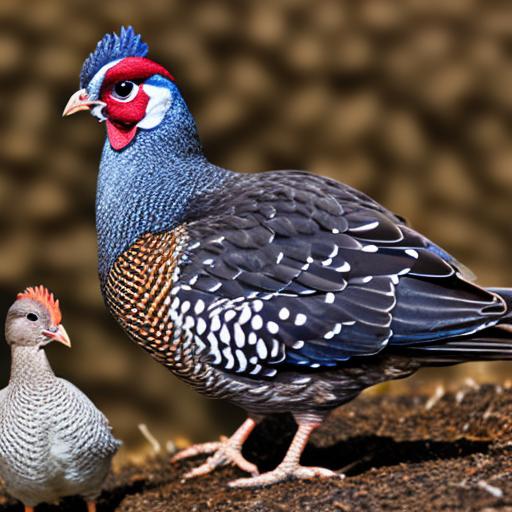Keeping guinea fowl and chickens together can be a rewarding experience for poultry enthusiasts. Both guinea fowl and chickens are popular choices for backyard flocks, and they can coexist peacefully when given the right conditions. Guinea fowl are known for their insect-eating abilities and their loud, distinctive calls, while chickens are valued for their egg-laying capabilities and friendly demeanor. By understanding the differences between these two types of birds and taking the necessary precautions, it is possible to successfully keep them together in the same environment. In this article, we will explore the benefits, considerations, potential challenges, and tips for introducing guinea fowl to an existing chicken flock, providing a comprehensive guide for those interested in keeping these birds together.
Key Takeaways
- Guinea fowl and chickens can be kept together, but it requires careful consideration and planning.
- Guinea fowl are more independent and prefer to free-range, while chickens are more domesticated and prefer to stay close to their coop.
- Keeping guinea fowl and chickens together can provide benefits such as pest control, increased security, and a diverse flock.
- When housing guinea fowl and chickens together, it’s important to provide separate roosting areas and nesting boxes to accommodate their different behaviors.
- Potential challenges of keeping guinea fowl and chickens together include aggression, disease transmission, and differences in dietary needs.
Understanding the Differences Between Guinea Fowl and Chickens
Guinea fowl and chickens have several key differences that should be taken into consideration when keeping them together. Firstly, guinea fowl are known for their strong flying abilities, while chickens are primarily ground-dwelling birds. This means that guinea fowl may roost in trees or on top of buildings, while chickens typically roost in low-lying areas such as nesting boxes or roosting bars. Additionally, guinea fowl are more independent and have a strong instinct for foraging, whereas chickens are more reliant on their owners for food and care. Guinea fowl are also known for their loud calls, which can be a source of annoyance for some people, while chickens are generally quieter. Understanding these differences is crucial for creating a harmonious environment for both types of birds.
On the other hand, there are also similarities between guinea fowl and chickens that can make them compatible companions. Both birds are social creatures and thrive in flocks, so they can provide companionship for each other. Additionally, both guinea fowl and chickens have similar dietary needs, enjoying a diet of grains, seeds, insects, and vegetation. This means that they can be fed the same type of feed, making it easier to manage their nutritional requirements. By understanding both the differences and similarities between guinea fowl and chickens, poultry enthusiasts can create an environment that meets the needs of both types of birds.
Benefits of Keeping Guinea Fowl and Chickens Together
There are several benefits to keeping guinea fowl and chickens together in the same environment. One of the main advantages is pest control. Guinea fowl are excellent at controlling insect populations, including ticks, flies, and other pests that can be harmful to both birds and humans. By allowing guinea fowl to roam freely with chickens, they can help to keep the insect population in check, reducing the need for chemical pest control methods. Additionally, guinea fowl are known for their alertness and ability to sound the alarm in the presence of predators, which can help to protect the entire flock, including the chickens.
Another benefit of keeping guinea fowl and chickens together is the diversity they bring to the flock. Guinea fowl have a unique appearance and behavior that can add interest and variety to a mixed poultry flock. Their distinctive calls and active foraging behavior can create a dynamic and lively atmosphere in the coop or yard. Additionally, guinea fowl are known for their hardiness and resilience, which can benefit the overall health and well-being of the flock. By keeping guinea fowl and chickens together, poultry enthusiasts can enjoy the benefits of both types of birds while creating a diverse and vibrant flock.
Considerations for Housing Guinea Fowl and Chickens Together
When housing guinea fowl and chickens together, there are several important considerations to keep in mind. Firstly, it is essential to provide adequate space for both types of birds to roam and forage. Guinea fowl are more active foragers than chickens and require a larger area to explore. Providing ample space will help to prevent overcrowding and reduce the likelihood of aggression or territorial behavior between the birds. Additionally, it is important to provide suitable roosting areas for both guinea fowl and chickens. Guinea fowl prefer to roost in elevated areas such as trees or high perches, while chickens prefer lower roosting spots such as nesting boxes or roosting bars. Providing multiple roosting options will help to accommodate the different preferences of each type of bird.
Another consideration for housing guinea fowl and chickens together is providing adequate shelter and protection from predators. Guinea fowl are more alert and vocal than chickens, which can help to alert the flock to potential threats. However, it is still important to provide secure coops or shelters to protect the birds from predators such as foxes, raccoons, and birds of prey. Additionally, it is important to consider the climate and weather conditions in the area when housing guinea fowl and chickens together. Guinea fowl are more cold-hardy than chickens and can tolerate lower temperatures, so providing suitable shelter and protection from extreme weather is essential for both types of birds.
Potential Challenges of Keeping Guinea Fowl and Chickens Together
While there are many benefits to keeping guinea fowl and chickens together, there are also potential challenges that should be considered. One challenge is the different social dynamics between guinea fowl and chickens. Guinea fowl have a more hierarchical social structure than chickens, which can lead to conflicts within the flock. It is important to monitor the behavior of both types of birds and intervene if any aggressive behavior occurs. Additionally, guinea fowl are known for their loud calls, which can be disruptive to some people. This can be a potential challenge for those living in close proximity to neighbors or in urban areas.
Another potential challenge of keeping guinea fowl and chickens together is disease management. While both types of birds can be susceptible to certain diseases, they may have different immune responses or treatment requirements. It is important to monitor the health of both types of birds closely and consult with a veterinarian if any signs of illness or disease occur. Additionally, providing separate feeding and watering stations for guinea fowl and chickens can help to reduce the risk of disease transmission between the two types of birds. By being aware of these potential challenges and taking proactive measures to address them, poultry enthusiasts can create a harmonious environment for both guinea fowl and chickens.
Tips for Introducing Guinea Fowl to an Existing Chicken Flock

Introducing guinea fowl to an existing chicken flock requires careful planning and consideration to ensure a smooth transition for both types of birds. One tip is to introduce guinea fowl when they are young or as keets (baby guinea fowl). This allows them to grow up alongside the chickens and become accustomed to their presence from an early age. It is also important to provide separate feeding and watering stations for the guinea fowl initially to prevent competition with the chickens. This will help to reduce any potential conflicts over resources during the introduction period.
Another tip for introducing guinea fowl to an existing chicken flock is to monitor their behavior closely during the integration process. It is normal for there to be some initial pecking order disputes as the birds establish their social hierarchy. However, if any aggressive behavior or bullying occurs, it may be necessary to separate the birds temporarily until they become more accustomed to each other’s presence. Additionally, providing multiple hiding spots or shelters within the coop or yard can help to reduce stress and provide a safe space for both guinea fowl and chickens during the integration process. By following these tips and being patient during the introduction process, poultry enthusiasts can successfully integrate guinea fowl into an existing chicken flock.
Conclusion and Final Thoughts on Keeping Guinea Fowl and Chickens Together
In conclusion, keeping guinea fowl and chickens together can be a rewarding experience that offers several benefits for poultry enthusiasts. By understanding the differences between these two types of birds, considering important housing considerations, being aware of potential challenges, and following tips for introducing guinea fowl to an existing chicken flock, it is possible to create a harmonious environment for both types of birds. The pest control abilities of guinea fowl, their unique appearance and behavior, and their resilience make them valuable additions to a mixed poultry flock. With careful planning and consideration, poultry enthusiasts can enjoy the diverse and vibrant atmosphere that comes with keeping guinea fowl and chickens together.
If you’re considering keeping guinea fowl and chickens together, it’s important to understand the dynamics between these two bird species. While they can coexist, there are certain considerations to keep in mind. For more insights on creating a harmonious living environment for different poultry species, check out this article on large chicken coop ideas. Understanding the space and resources needed for multiple bird species can help ensure a successful and peaceful cohabitation.
FAQs
Can guinea fowl and chickens be kept together?
Yes, guinea fowl and chickens can be kept together in the same coop and run. However, there are some considerations to keep in mind when housing these two species together.
What are the considerations for keeping guinea fowl and chickens together?
It is important to provide enough space for both guinea fowl and chickens to roam and forage. Additionally, guinea fowl are more active and can be aggressive towards chickens, so it is important to monitor their interactions and provide hiding spots for the chickens if needed.
Do guinea fowl and chickens have similar housing and dietary needs?
Guinea fowl and chickens have similar housing and dietary needs, as they both require shelter, roosting space, and access to food and water. However, guinea fowl are more insectivorous and may require additional protein in their diet compared to chickens.
Are there any health concerns when keeping guinea fowl and chickens together?
There are no specific health concerns when keeping guinea fowl and chickens together, as long as they are provided with a clean and well-maintained living environment. It is important to monitor for any signs of aggression or stress between the two species.
Can guinea fowl and chickens coexist peacefully?
With proper management and monitoring, guinea fowl and chickens can coexist peacefully. Providing enough space, hiding spots, and monitoring their interactions can help minimize any potential conflicts between the two species.
Meet Walter, the feathered-friend fanatic of Florida! Nestled in the sunshine state, Walter struts through life with his feathered companions, clucking his way to happiness. With a coop that’s fancier than a five-star hotel, he’s the Don Juan of the chicken world. When he’s not teaching his hens to do the cha-cha, you’ll find him in a heated debate with his prized rooster, Sir Clucks-a-Lot. Walter’s poultry passion is no yolk; he’s the sunny-side-up guy you never knew you needed in your flock of friends!







